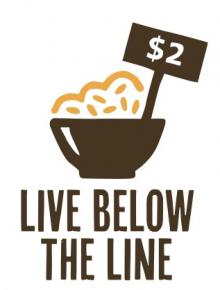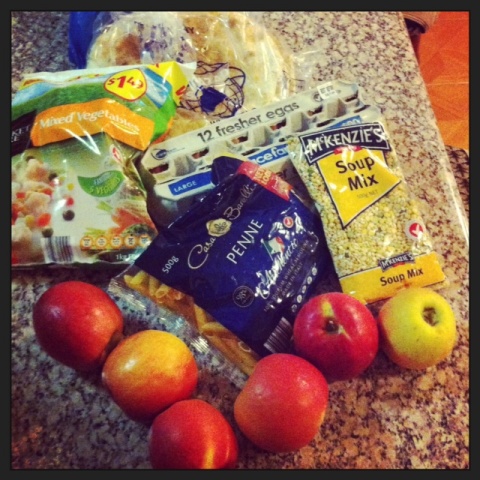if only i’d known: i have more than enough

From May 6-10 my friends and I lived on $2 a day to help raise money and awareness for those living in extreme poverty.
Live Below the Line (as in the poverty line) was a campaign launched by Oaktree Foundation and supported by the Global Poverty Project. Funds raised go toward providing education and skills training to those living in extreme poverty. If you’re interested in the specifics of the project you can check them out here.
In line with the rules of the challenge I spent less than $10 on food for the week. And let me tell you, it was not an easy task. I had to drive to FIVE different supermarkets/shops to get myself what I thought was going to be a decent supply of food for the week. It wasn’t. Not to mention the fact that people who are actually living in poverty would never have the luxury of driving half way around the city to find the cheaper bargains.

My food supply for the week
The most difficult thing I found was the lack of flavour and the lack of variety. What’s a foodie to do?
By Friday I was hungry, bored and desperately craving sweets. Hell, had someone handed me a bag of raw sugar at midnight on Friday I would have scoffed the whole thing down like a tube of orange sherbet.
But that’s the point. I have never thought of myself as wealthy. I have never thought of myself as someone with a high disposable income. In fact, being a PhD student, I’d always thought I was doing it much tougher than others. But I have never known what it is to go hungry.
Not be hungry but go hungry. I have always had the luxury of warm meals, warm clothes and a warm bed. I have always had the luxury of eating healthily, showering and inviting people over to share a meal.
As the physical effects of our challenge wear off I find myself reflecting on how much each meal costs. Collectively, as a society, we spend little time reflecting on how fortunate we are and focusing on the things we don’t have, the things we want so desperately – the new car, a bigger house, more shoes – that we don’t realise we have enough.
The second greatest realisation was that poverty is an extremely isolating experience. We were supremely fortunate in that we undertook this challenge as a team, AND that the point of the challenge was to raise awareness. But remove both the purpose of the campaign and the team support and you are left with something that is closer to the reality of poverty.
I don’t know about you but nearly all of my socialising takes place over food. Sometimes it’s coffee and a few (OK, fine, a whole packet of) biscuits; sometimes it’s a plate of sizzling garlic prawns – but it always combines a simultaneous stimulation of my mind and taste buds. If I had only $10 for food I would have to decline every social event, every week, which would leave me quite isolated from my friends.
Add to this the shame that people associate with living in poverty and we understand why the realities of poverty are rarely spoken about by those who experience them.
All of this is, of course, compounded if you’re responsible for feeding a family. In particular, the pressures of having school aged children who require being fed at a particular standard so that their peers do not catch wind of their financially deprived situation, and of course so that they’re able to concentrate in class.
This realisation made me think of my parents. My parents assumed traditional gender roles. My mum kept house while my dad made money. But despite being a highly intelligent man my father was uneducated. He had never been given the opportunity to study and without a piece of paper as tribute to qualification the sorts of jobs available to one can be very limited.
That’s not to say we lived in poverty or anything remotely close to it but it does mean that when you grow up in a middle class suburb you are acutely aware of the fact that you don’t have as much as the other kids. I understand that this is still a privileged position to be in. But it does give me the perspective to reflect on the role education can play in relieving financial burdens. By virtue of completing the work required to receive a big white piece of paper we are eligible and find ourselves competitive for jobs my father would never have been.
Of course this was the point. Pushing us to get a decent education and excel at school and well into university was a bid to protect us from the hardship of financial struggle. Having money and a steady, decent income makes life easier to live, it gives you the mental capacity to enjoy the things around you and the people around you and often times education is paramount to that situation.
Of course many educated people find themselves in a debt spiral not spurred by necessity but desire and that is another matter entirely. But we can all make a difference by supporting programs that provide education to those who need it most. If you’re feeling particularly generous you can make a donation to us here. (Shameless plug)

